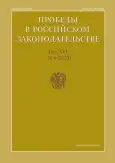Mistakes of Law: Types and Its Effect to Negate the State of Mind Requirement
- Authors: Korableva S.Y.1
-
Affiliations:
- Moscow State Linguistic University
- Issue: Vol 16, No 6 (2023)
- Pages: 212-217
- Section: Criminal Law Sciences
- URL: https://journals.eco-vector.com/2072-3164/article/view/623615
- EDN: https://elibrary.ru/MAGXBZ
- ID: 623615
Cite item
Abstract
The purpose of the research is to classify mistakes of law depending on their impact on mens rea and culpability. Based on the analysis of legal norms, theoretical provisions and judicial practice, controversial issues of using the presumption of a knowledge about wrongfulness are identified, as well as the possibility of refuting this presumption. This is necessary because a person’s misconceptions regarding the content of the criminal law are structural elements of mens rea. As a consequence, they must be considered mitigating circumstances or defenses. Results. The author proves that mistakes of law should be considered as excusable (excluding guilt) or non-excusable (constituting guilt), depending on the type of criminal law prohibition. For malum in se crimes, the presumption of knowledge of the law is reasonable. Here, only partial mistakes of law are possible, which can be considered as mitigating circumstances. or malum prohibitum crimes, mistakes of law can be considered not only as mitigating circumstances, but also as defenses in the event that the person’s act either did not cause objective harm at all, or if there was nothing subject to social criticism in the person’s behavior.
Full Text
About the authors
S. Yu. Korableva
Moscow State Linguistic University
Author for correspondence.
Email: sukorableva@gmail.com
ORCID iD: 0000-0002-7071-3597
SPIN-code: 3744-1680
ResearcherId: 8261-2023
Cand.Sci.(Law), Associate Professor, associate professor of Criminal Law Disciplines Department, Institute of International Law and Justice
Russian Federation, MoscowReferences
- Goloskokov L.V. Presumption of knowledge of the law in the light of the theory of network law. Legal techniques. 2007. № 1. p. 192–202.
- Goryachev I. N. On the statistical grounds of the presumption of knowledge of the law in Russian criminal law. Legal techniques. 2010. № 4. p. 130–144.
- Dorogin D. A. Types of a legal mistake excluding criminal responsibility references. Lex Russica. 2019. № 8 (153). p. 74–85.
- Ivanov A. G. Subjective error in the criminal legal structure of guilt: a comparative analysis of the legislation of Europe and Russia. Bulletin of. Lobachevsky State University of Nizhny Novgorod. 2022. № 3. p. 113–118.
- Korableva S. Yu. Mens rea in national criminal-law systems: Monograph. M.: Ru-Science, 2020. 160 p.
- Laikova E. A. Subjective Elements of the Offences Stipulated in art. St. З222, 3223 of the Criminal Code of the Russian Federation. Siberian law herald. 2017. № 3. p. 54–59.
- Levchenko V. B., Starostin S. A. Fixing the presumption of innocence in the system of principles of the legislation administrative offences. Man: crime and punishment. 2016. № 4 (95). p. 16–20.
- Morgunov S. V., Shatilovich S. N. The algorithm for delineation of elements of unlawful acts against the procedure of migration registration (article 19.27 of the RF Code of Administrative Offences And Article 322.3 of The RF Criminal Code). Legal Science and Law Enforcement Practice. 2016. № 1 (35). p. 106–116.
- Rakhmanin S.V. The problem of rebuttability of the presumption of knowledge of the law and mistake of law in criminal law. Law and Politics. 2019. № 3. p. 41–46.
- Shatilovich S. N. Liability for crimes under article 322.2 of the Criminal code of the Russian Federation: issues of theory and practice. Legal Science and Law Enforcement Practice. 2016. № 4 (38). p. 60–65.
- Shiryaev A. Yu. The Problem of Assessment of Guilt in the Light of Error Juris Doctrine. Rossiiskoe pravo: obrazovanie, praktika, nauka. 2020. № 6. p. 49–55.
- Gray R. L. (1995) Eliminating the (Absurd) Distinction Between Malum In Se and Malum Prohibitum Crimes. Washington University Law Review, vol. 73, no. 3, p. 1369–1398.
Supplementary files











